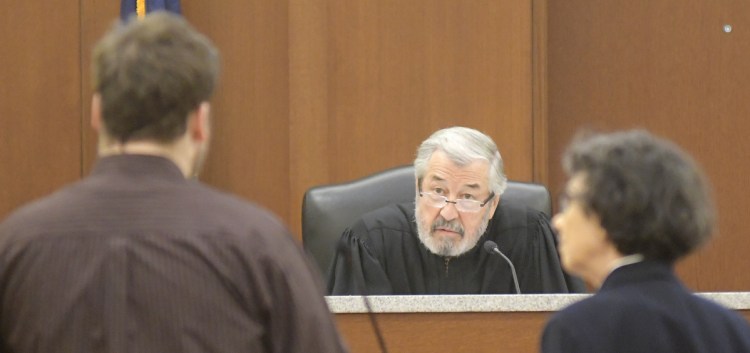A 24-year-old man serving seven years in prison for sexually assaulting an 11-year-old girl in a portable outhouse in North Belgrade wants the state’s highest court to reverse two rulings in his case.
Travis R. Gerrier, of Belgrade and Dixmont, pleaded guilty conditionally last August to charges of gross sexual assault, unlawful sexual contact and furnishing liquor to a minor with the understanding that he could withdraw those pleas if the Maine Supreme Judicial Court, acting as the Law Court, ruled in his favor in the appeal.
He is appealing rulings that found him competent to stand trial and that refused to suppress a confession Gerrier made to a state police detective after Gerrier and the girl were found together in the outhouse the night of June 3-4, 2015, after the girl’s family had reported her missing. Gerrier was arrested June 12, 2015, on the charges.
At the August 2017 plea hearing, Assistant District Attorney Kristin Murray-James described the crimes, saying Gerrier knew the girl was 11 and that she told him via Facebook that she was walking to the snack shack in Belgrade after an argument with her mother. Murray-James said Gerrier brought a bottle of whiskey-laced Gatorade with him.
The girl later said, “After drinking it, she felt dizzy and out of it,” Murray-James noted.
In contrast, Gerrier’s defense attorney said various evaluators found he had the mind of an 11- or 12-year-old and that he was not capable of understanding the court process and communicating and cooperating with his attorney.
At oral arguments last week in Portland, Gerrier’s attorney, Harold Hainke, said Gerrier has aspects of autism, pervasive developmental disorder, mood disorder and social anxiety and would have difficulty communicating with his attorney.
“He thought if (the girl) explained that the acts were consensual, he may be let go,” Hainke said.
Supreme Court Associate Justice Donald Alexander pointed out that Gerrier and the girl exchanged 50 messages through text and/or Facebook to arrange the meeting that night and that Gerrier brought alcohol.
“Clearly he did a lot of communication with the victim, advance planning to get her under the influence perhaps,” Alexander noted. “That doesn’t look like someone incapable of communicating with their attorney.”
Hainke said the superior court judge should have relied more on a competency evaluation done by psychologist Robert Riley rather than two earlier evaluations by others performed for different purposes.
Associate Justice Jeffrey Hjelm asked, “Is it the state’s burden to prove that a defendant is competent, or is it the defendant’s burden to prove that he is not competent?”
Hjelm said the answer affects the law court’s standard of review.
Hainke said he did not known the answer.
Associate Justice Ellen Gorman asked Hainke, “How can you argue that the court was compelled to believe what Dr. Riley said when he testified?”
Hainke said Riley’s evaluation, and the most recent, were specific for competence.
Gorman said, “A trial judge’s job, as you know, is to sift through all the evidence that has been presented and determine what is the most reliable, what is the most convincing, and based on that, make a decision. You’re suggesting that the trial judge erred in accepting medical testimony, medical evidence from two people who did not find your client to be incompetent. How can we say that a trial judge is compelled to do that?”
At the oral argument, Murray-James asked the justices to uphold the lower court rulings. She said Gerrier’s statements to the detective were voluntary and that Gerrier understood he was not in custody when being questioned in the police vehicle and was told three times he would not be arrested that night.
The 98-minute recording was played in the courtroom at the suppression hearing.
Murray-James said Gerrier had been prepared to accept a deal to plead to the lesser charge of unlawful sexual contact until he realized it required him to register as a lifetime sex offender.
“Competency doesn’t change depending on what crime you’re charged with and what sentence you may be facing,” she said.
At that time, in August 2016, Gerrier was removed kicking and screaming from the court. The proposed sentence was to be nine months in jail.
Gerrier talked about that incident at his sentencing hearing, telling Justice Donald Marden, “I just want to say I apologize for my outburst that day and that I am extremely sorry for my actions and what I done. If I could take this back I would, but I can’t. I’m not asking that anyone forgive me, but if they did, it would mean a lot.”
Alexander said, “In reality, there’s probably a higher degree of competency to affirmatively waive rights than to exercise rights to silence and stand trial.”
In rebuttal, Hainke argued that Gerrier could not perform any advanced thought processes.
The Law Court issues rulings in writing some time after the hearings.
Gerrier is serving his sentence at Mountain View Correctional Center. The Maine Department of Corrections’ website indicates his earliest release date is in April 2022. The prison term is to be followed by 20 years of supervised release.
Betty Adams — 621-5631
Twitter: @betadams
Comments are not available on this story.
Send questions/comments to the editors.



